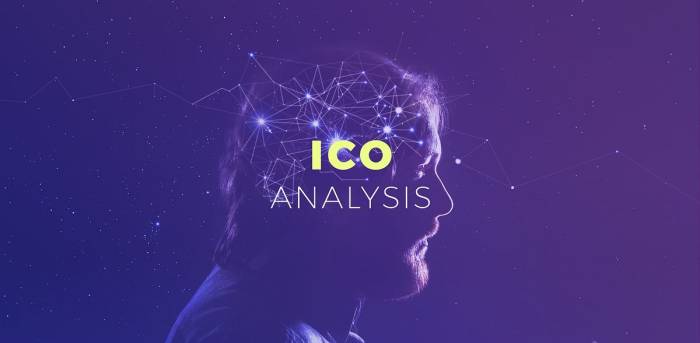ICO analysis is where it’s at, peeps! Dive into the world of crypto investments with a breakdown of key factors and tools that can make or break your next move.
Get ready to uncover the secrets behind strategic market analysis, team evaluations, and the tech assessments that shape the ICO landscape.
Overview of ICO Analysis
When it comes to ICO analysis, we’re talking about digging deep into initial coin offerings to evaluate their potential and risks. It’s like doing your homework before investing your hard-earned cash in a new crypto project.
The importance of conducting ICO analysis cannot be overstated. It helps investors make informed decisions, avoiding scams and identifying projects with real potential. By analyzing various aspects of an ICO, you can assess its viability and determine if it aligns with your investment goals.
Key Components of ICO Analysis
- Team: Check out the backgrounds and experience of the project team. A strong, knowledgeable team is crucial for the success of an ICO.
- Whitepaper: Dive deep into the project’s whitepaper to understand the problem it aims to solve, the technology behind it, and the roadmap for development.
- Tokenomics: Analyze the token distribution, utility, and potential value of the tokens. A well-designed tokenomics model is essential for the long-term success of an ICO.
- Market Potential: Assess the market need for the project’s solution and the potential for adoption. A project with a large addressable market is more likely to succeed.
- Legal and Regulatory Compliance: Ensure that the project complies with relevant laws and regulations. Investing in a project that faces legal challenges can be risky.
Factors to Consider in ICO Analysis
When evaluating an Initial Coin Offering (ICO), there are several key factors that need to be carefully considered to make an informed decision. These factors include market analysis, team evaluation, and technology assessment.
Role of Market Analysis in ICO Evaluation
Market analysis plays a crucial role in ICO evaluation as it helps investors understand the demand for the project’s token. By analyzing market trends, competition, and target audience, investors can assess the potential success of the ICO. Factors such as market size, growth potential, and regulatory environment should be taken into consideration during market analysis.
Significance of Team Evaluation During ICO Analysis
The team behind an ICO is a critical factor that can determine the project’s success. Investors should evaluate the team’s experience, expertise, and track record in the industry. A strong and capable team inspires confidence in investors and increases the likelihood of the project achieving its goals. Team evaluation also involves assessing the team’s communication skills, transparency, and ability to execute the project’s roadmap.
Importance of Technology Assessment in ICO Analysis
Technology assessment is another important factor in ICO analysis, as it helps investors evaluate the project’s technical feasibility and innovation. Investors should assess the project’s whitepaper, codebase, and prototype to understand the underlying technology and its potential impact. Factors such as scalability, security, and decentralization should be considered during technology assessment to determine the project’s long-term viability and competitiveness in the market.
Types of ICO Analysis
![]()
When it comes to analyzing ICOs, there are different methods that can be used to evaluate the potential success and risks associated with a project. Fundamental analysis, technical analysis, qualitative analysis, and quantitative analysis are all important tools that investors can use to make informed decisions.
Fundamental Analysis
Fundamental analysis involves evaluating the underlying factors that can affect the value of a cryptocurrency or token. This includes looking at the team behind the project, the technology being developed, the market demand for the product, and the potential for growth in the future. By conducting fundamental analysis, investors can gain a better understanding of the long-term prospects of an ICO.
Technical Analysis
Technical analysis, on the other hand, involves studying past price movements and trading volumes to predict future price trends. This method uses charts and statistical indicators to identify patterns and trends in the market. While some investors believe that technical analysis can be a useful tool for predicting short-term price movements, others argue that it may not be as reliable when it comes to long-term investment decisions.
Qualitative vs. Quantitative Analysis
Qualitative analysis focuses on evaluating the non-numeric aspects of an ICO, such as the team’s experience, the project’s roadmap, and the overall vision of the company. This type of analysis is more subjective and relies on the investor’s judgment and intuition.
On the other hand, quantitative analysis involves using numerical data and metrics to assess the potential value of an ICO. This can include factors such as the token distribution, the token economics, and the market cap of the project. Quantitative analysis is more objective and data-driven, providing investors with concrete information to base their decisions on.
In conclusion, each type of analysis has its own strengths and weaknesses, and investors may choose to use a combination of methods to conduct a comprehensive evaluation of an ICO before making an investment decision.
Tools and Resources for ICO Analysis

When it comes to analyzing ICO projects, having the right tools and resources can make a significant difference in making informed decisions. Let’s explore some of the key platforms and software used in ICO analysis.
Whitepaper Analysis Tools
Whitepapers are essential documents that Artikel the details of an ICO project, including its goals, technology, team, and roadmap. Analyzing these whitepapers manually can be time-consuming and challenging. This is where whitepaper analysis tools come into play. These tools use algorithms to scan and analyze whitepapers, providing insights into key metrics such as credibility, feasibility, and potential risks associated with the project.
- TokenAI: TokenAI is a platform that uses artificial intelligence to evaluate ICO whitepapers and provide ratings based on various criteria.
- ICO Bench: ICO Bench offers a whitepaper analysis service that assesses the quality and authenticity of ICO projects.
- CoinCheckup: CoinCheckup provides a comprehensive analysis of ICO whitepapers, helping investors make informed decisions.
Social Media Sentiment Analysis
Social media plays a significant role in shaping public opinion and investor sentiment towards ICO projects. Analyzing social media sentiment can provide valuable insights into how the community perceives a particular project, which can influence its success or failure. By tracking mentions, comments, and discussions on platforms like Twitter, Reddit, and Telegram, investors can gauge the overall sentiment towards an ICO project.
- Sentiment Analysis Tools: Tools like Social Mention, Brandwatch, and Hootsuite can help in monitoring social media sentiment and trends related to ICO projects.
- Social Media Analytics Platforms: Platforms like BuzzSumo and Sprout Social offer in-depth analytics and insights into social media conversations, which can be valuable for ICO analysis.





